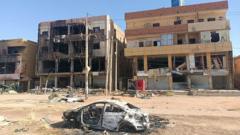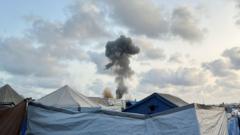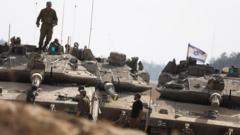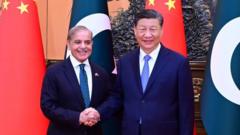In a significant shift, France, the UK, and Canada have condemned Israel's ongoing military operations in Gaza, demanding a ceasefire and increased humanitarian aid access. Citing intolerable levels of suffering, they express a growing political anger that could lead to further actions against Israel if changes are not made.
Western Allies Turn Against Israel Amid Growing Discontent Over Gaza Offensive

Western Allies Turn Against Israel Amid Growing Discontent Over Gaza Offensive
As the humanitarian crisis intensifies, the UK, France, and Canada voice strong condemnation of Israel's military actions in Gaza, calling for an end to the offensive.
In a stark shift of sentiment, the United Kingdom, France, and Canada have issued a strong condemnation of Israel's ongoing military offensive in Gaza, underscoring an increasingly tenuous goodwill among its traditional allies. The escalation of Israel's war, sparked by the Hamas attacks on October 7, 2023, has drawn harsh criticism as civilian casualties in Gaza climb, with reports indicating thousands of deaths since the end of a ceasefire in March.
These three governments are calling for an immediate ceasefire, with Prime Minister Benjamin Netanyahu's justification of the operations—aimed at dismantling Hamas and rescuing hostages—being dismissed as disproportionate by leaders in London, Ottawa, and Paris. Their joint statement highlighted the humanitarian crisis, stating, "The level of human suffering in Gaza is intolerable."
Netanyahu, facing international pressure, insisted that Israel's military actions were a necessity for national security and cannot be negotiated. He claimed that the war would cease only if Hamas returned its hostages, disarmed, and allowed for the demilitarization of Gaza. Critics note that his administration’s recent concession to allow a limited food supply into Gaza was inadequate in light of the unfolding humanitarian disaster.
The condemnation marks a significant escalation in diplomatic rhetoric, as nations like France, led by President Macron, express a firm stance against Israel's tactics. The events of late March, when 15 medics and humanitarian workers were killed by Israeli forces, have become a pivot point, reflecting a line crossed in the international community's perception of the ongoing conflict.
With growing anger and a commitment to reassess their relationship with Israel, the allied countries have suggested they may take "concrete steps" if the military operations do not cease and humanitarian access is not prioritized. Potential measures could include sanctions or even formal recognition of Palestinian statehood—a move that would challenge Israeli narratives and possibly reshape the geopolitical landscape in the region.
As condemnation mounts, Netanyahu’s government may face escalating pressures not only from international allies but also from within, where prominent voices oppose his strategies. The humanitarian crisis continues to develop, leaving many observers questioning the future of Israeli governance and its implications for peace in the Middle East.
These three governments are calling for an immediate ceasefire, with Prime Minister Benjamin Netanyahu's justification of the operations—aimed at dismantling Hamas and rescuing hostages—being dismissed as disproportionate by leaders in London, Ottawa, and Paris. Their joint statement highlighted the humanitarian crisis, stating, "The level of human suffering in Gaza is intolerable."
Netanyahu, facing international pressure, insisted that Israel's military actions were a necessity for national security and cannot be negotiated. He claimed that the war would cease only if Hamas returned its hostages, disarmed, and allowed for the demilitarization of Gaza. Critics note that his administration’s recent concession to allow a limited food supply into Gaza was inadequate in light of the unfolding humanitarian disaster.
The condemnation marks a significant escalation in diplomatic rhetoric, as nations like France, led by President Macron, express a firm stance against Israel's tactics. The events of late March, when 15 medics and humanitarian workers were killed by Israeli forces, have become a pivot point, reflecting a line crossed in the international community's perception of the ongoing conflict.
With growing anger and a commitment to reassess their relationship with Israel, the allied countries have suggested they may take "concrete steps" if the military operations do not cease and humanitarian access is not prioritized. Potential measures could include sanctions or even formal recognition of Palestinian statehood—a move that would challenge Israeli narratives and possibly reshape the geopolitical landscape in the region.
As condemnation mounts, Netanyahu’s government may face escalating pressures not only from international allies but also from within, where prominent voices oppose his strategies. The humanitarian crisis continues to develop, leaving many observers questioning the future of Israeli governance and its implications for peace in the Middle East.




















